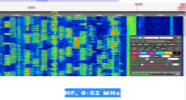Registe-se, faça a sua apresentação e terá acesso total ao TX&RX Fórum. ___________________________ Apresente-se dizendo quem é, escreva algo sobre si. Exemplo: Nome, indicativo, nome de estação, localidade, o que mais gosta de fazer no mundo das radio-comunicações e outras coisas que ache importante para a sua apresentação. Se é novato não tenha vergonha de o dizer, pois cá estamos para o ajudar.
___________________________ O TX&RX Fórum destina-se à publicações de mensagens "posts" relacionados com todos os assuntos sobre Radio Frequência. Essas mensagens têm como objectivo promover ideias, experiências, projectos, esclarecer duvidas, divulgação de actividades e publicações de novidades sobre Radio Comunicações.
Divirta-se!!
___________________________ O TX&RX Fórum destina-se à publicações de mensagens "posts" relacionados com todos os assuntos sobre Radio Frequência. Essas mensagens têm como objectivo promover ideias, experiências, projectos, esclarecer duvidas, divulgação de actividades e publicações de novidades sobre Radio Comunicações.
Divirta-se!!
SUN HAS LIKELY ENTERED NEW EVOLUTIONARY PHASE, SAY ASTRONOMERS
Página 1 de 1
 SUN HAS LIKELY ENTERED NEW EVOLUTIONARY PHASE, SAY ASTRONOMERS
SUN HAS LIKELY ENTERED NEW EVOLUTIONARY PHASE, SAY ASTRONOMERS
[Tens de ter uma conta e sessão iniciada para poderes visualizar esta imagem]
by Bruce Dorminey
The Sun has likely already entered into a new unpredicted long-term phase of its evolution as a hydrogen-burning main sequence star — one characterized by magnetic sputtering indicative of a more quiescent middle-age. Or so say the authors of a new paper submitted to The Astrophysical Journal Letters.
Using observations of other sunlike stars made by NASA ’s Kepler Space Telescope, the team found that the Sun is currently in a special phase of its magnetic evolution.
Heretofore, the Sun was thought to have been just a more slowly rotating version of a normal yellow dwarf (G-spectral type) star. These results offer the first real confirmation that the Sun is in the process of crossing into its magnetic middle age, where its 11-year Sunspot cycles are likely to slowly disappear entirely. That is, from here on out, the Sun is likely to have fewer sunspots than during the first half of its estimated 10 billion year life as a hydrogen-burning star.
“The Sun’s 11-year sunspot cycle is likely to disappear entirely, not just get less pronounced; [since] other stars with similar rotation rates show no sunspot cycles,” Travis Metcalfe, the paper’s lead author and an astronomer at the Space ScienceInstitute in Boulder, Colo., told me.
Metcalfe says this transition takes a few hundred million years, but once the Sun completely crosses this Rubicon of middle age, it will remain magnetically inactive for the rest of its hydrogen-burning life.
We now understand that every star goes through this phase, says Metcalf, and that the Sun has a peculiar magnetic cycle for its rotation rate because it is in the middle of the transition to a less magnetically-active state. And he notes that this new realization does help explain why the Sun’s current surface activity doesn’t jibe with patterns seen on many other sunlike stars…
- READ MORE
- SWLing
by Bruce Dorminey
The Sun has likely already entered into a new unpredicted long-term phase of its evolution as a hydrogen-burning main sequence star — one characterized by magnetic sputtering indicative of a more quiescent middle-age. Or so say the authors of a new paper submitted to The Astrophysical Journal Letters.
Using observations of other sunlike stars made by NASA ’s Kepler Space Telescope, the team found that the Sun is currently in a special phase of its magnetic evolution.
Heretofore, the Sun was thought to have been just a more slowly rotating version of a normal yellow dwarf (G-spectral type) star. These results offer the first real confirmation that the Sun is in the process of crossing into its magnetic middle age, where its 11-year Sunspot cycles are likely to slowly disappear entirely. That is, from here on out, the Sun is likely to have fewer sunspots than during the first half of its estimated 10 billion year life as a hydrogen-burning star.
“The Sun’s 11-year sunspot cycle is likely to disappear entirely, not just get less pronounced; [since] other stars with similar rotation rates show no sunspot cycles,” Travis Metcalfe, the paper’s lead author and an astronomer at the Space ScienceInstitute in Boulder, Colo., told me.
Metcalfe says this transition takes a few hundred million years, but once the Sun completely crosses this Rubicon of middle age, it will remain magnetically inactive for the rest of its hydrogen-burning life.
We now understand that every star goes through this phase, says Metcalf, and that the Sun has a peculiar magnetic cycle for its rotation rate because it is in the middle of the transition to a less magnetically-active state. And he notes that this new realization does help explain why the Sun’s current surface activity doesn’t jibe with patterns seen on many other sunlike stars…
- READ MORE
- SWLing
__________________________________
Qualquer duvida exponha no Fórum.
Vamos ajudar-lhe.
Com as suas duvidas, vamos aprender!
Por isso existe o [Tens de ter uma conta e sessão iniciada para poderes visualizar esta imagem]
O chat é no Telegram - Link de convite
- [Tens de ter uma conta e sessão iniciada para poderes visualizar este link]
- [Tens de ter uma conta e sessão iniciada para poderes visualizar este link]
- [Tens de ter uma conta e sessão iniciada para poderes visualizar este link]
73 e tudo de bom
__________________________________________________
Convido-lhe a seguir e conviver.
Divirta-se!
Obrigado.
- TX&RX DX Chat no Telegram
- Siga o Facebook TX&RX Fórum
- TX&RX DX Grupo

ALF007- Administrador Fundador
Página 1 de 1
Permissões neste sub-fórum
Não podes responder a tópicos












 por
por 





